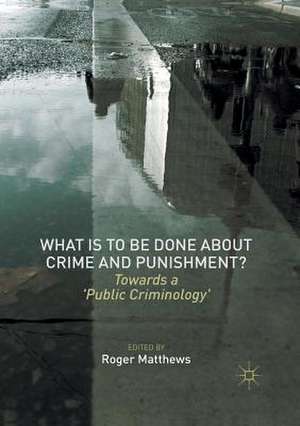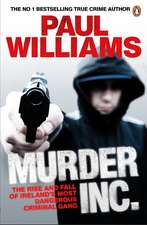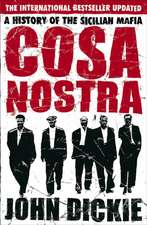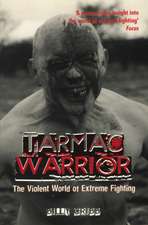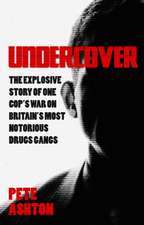What is to Be Done About Crime and Punishment?: Towards a 'Public Criminology'
Editat de Roger Matthewsen Limba Engleză Paperback – 22 dec 2017
This book responds to the claim that criminology is becoming socially and politically irrelevant despite its exponential expansion as an academic sub-discipline. It does so by addressing the question 'what is to be done' in relation to a number of major issues associated with crime and punishment.
The original contributions to this volume are provided by leading international experts in a wide range of issues. They address imprisonment, drugs, gangs, cybercrime, prostitution, domestic violence, crime control, as well as white collar and corporate crime. Written in an accessible style, this collection aims to contribute to the development of a more public criminology and encourages students and researchers at all levels to engage in a form of criminology that is more socially relevant and more useful.
| Toate formatele și edițiile | Preț | Express |
|---|---|---|
| Paperback (1) | 527.15 lei 6-8 săpt. | |
| Palgrave Macmillan UK – 22 dec 2017 | 527.15 lei 6-8 săpt. | |
| Hardback (1) | 699.77 lei 6-8 săpt. | |
| Palgrave Macmillan UK – 17 iun 2016 | 699.77 lei 6-8 săpt. |
Preț: 527.15 lei
Preț vechi: 620.18 lei
-15% Nou
Puncte Express: 791
Preț estimativ în valută:
100.88€ • 104.93$ • 83.28£
100.88€ • 104.93$ • 83.28£
Carte tipărită la comandă
Livrare economică 15-29 aprilie
Preluare comenzi: 021 569.72.76
Specificații
ISBN-13: 9781349848058
ISBN-10: 1349848050
Pagini: 324
Ilustrații: XV, 324 p.
Dimensiuni: 148 x 210 x 19 mm
Greutate: 0.41 kg
Ediția:1st ed. 2016
Editura: Palgrave Macmillan UK
Colecția Palgrave Macmillan
Locul publicării:London, United Kingdom
ISBN-10: 1349848050
Pagini: 324
Ilustrații: XV, 324 p.
Dimensiuni: 148 x 210 x 19 mm
Greutate: 0.41 kg
Ediția:1st ed. 2016
Editura: Palgrave Macmillan UK
Colecția Palgrave Macmillan
Locul publicării:London, United Kingdom
Cuprins
Chapter 1. Introduction: Towards a Public Criminology; Roger Matthews.- Chapter 2. The Violence Divide: Taking 'Ordinary' Crime Seriously in a Volatile World; Elliott Currie.- Chapter 3. Domestic Violence: The Increasing Tensions Between Experience, Theory, Research, Policy and Practice; Nicole Westmarland and Liz Kelly.- Chapter 4. Critical Realism and Gang Violence; John Pitts.- Chapter 5. Middle Range Critical Realism for Crime Prevention; Nick Tilley.- Chapter 6. Policing; Past, Present and Future; Ben Bowling, Shruti Iyer, Robert Reiner and James Sheptycki.- Chapter 7. Seven Ways to Make Prisons Work; Francis Cullen, Cheryl Jonson, Daniel Mears and Angela Thielo.- Chapter 8. Five Steps Towards a More Effective Global Drugs Policy; Caroline Chatwin.- Chapter 9. Taming Business? Understanding Effectiveness in the Control of Corporate and White Collar Crime; Fiona Haines.- Chapter 10. Cybercrime 4.0: Now What is to be Done?; Mike McGuire.- Chapter 11. Addressing Prostitution: The Nordic Model and Beyond; Helen Johnson and Roger Matthews.
Notă biografică
Roger Matthews is Professor of Criminology at the University of Kent, UK. His main areas of interest and research include imprisonment, sex trafficking and prostitution, social theory, crime prevention and community safety. He is author of Prostitution, Politics and Policy (2008), Doing Time: An Introduction to the Sociology of Imprisonment (2009), Realist Criminology (2014) and is co-author of Exiting Prostitution: A Study in Female Desistance (2014). He is currently involved in an ESRC funded research project examining patterns of victimisation in the inner city.
Textul de pe ultima copertă
This book responds to the claim that criminology is becoming socially and politically irrelevant despite its exponential expansion as an academic sub-discipline. It does so by addressing the question 'what is to be done' in relation to a number of major issues associated with crime and punishment.
The original contributions to this volume are provided by leading international experts in a wide range of issues. They address imprisonment, drugs, gangs, cybercrime, prostitution, domestic violence, crime control, as well as white collar and corporate crime. Written in an accessible style, this collection aims to contribute to the development of a more public criminology and encourages students and researchers at all levels to engage in a form of criminology that is more socially relevant and more useful.
Caracteristici
Asks what can be done about key issues such as: imprisonment, drugs, gangs, cybercrime and prostitution Offers an authoritative analysis of ‘realist’ criminology Argues that cultural criminology has much to learn from an engagement with realism
